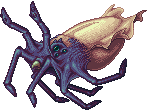Viewing AJp4F

Father: Unknown
Unknown Pedigree
Hardiness: 10
Appearance: 6
Emerged: 6:41 01.11.2022
Matured: 0:19 03.11.2022
Although Membra Cerbos never stop growing, their largest growth spurt is within the first year of their life, after which their growth drastically slows. Older Membra Cerbos as long as ten meters have been documented; since their typical lifespan remains unknown at this time, it is unclear if they can grow even larger. They are an extremely aggressive species, even when young, and few survive to adulthood. Rarely, younger individuals may appear “shy” in that they are more reactive than proactive, but they usually outgrow this behavior. Younger Membra Cerbos are also more likely to be drawn to land, though some spend their entire lives in the ocean. As they grow older, they recede to deeper ocean depths, seeming to prefer the darker, colder environment. Membra Cerbos are solitary by nature, approaching each other only during their short autumn mating season. They do not take long-term mates or form bonds between one another, and their eggs are laid and buried beneath the sand, then abandoned to survive on their own. Some Membra Cerbos, especially younger ones who are land traveling, have been observed to make and carry their own shelter out of shells, skulls, and random bones they scavenge from their prey. Tests in a laboratory environment show they will refuse to use items not obtained by themselves, even if swapped for a similar object. They tend to be quite clever, and care must be taken when housing them in a laboratory to be sure they do not escape.
The creatures that dwell in this rather desolate world still display some diversity in appearance, eating habits, and social behavior. Whether they have fur or feathers, skin or scales, their unique genetic makeup allows for a variety of colors and markings within each species. Despite limitations in food sources, herbivores, omnivores, and carnivores are all present in the food chain, and each species requires specialized care within a laboratory. Although the artificial setting of housing units and breeding pods precludes most opportunities to study true interspecific behavior, the interactions within and between species has been studied extensively in the wilderness by scientists daring enough to venture beyond the outpost’s walls.
